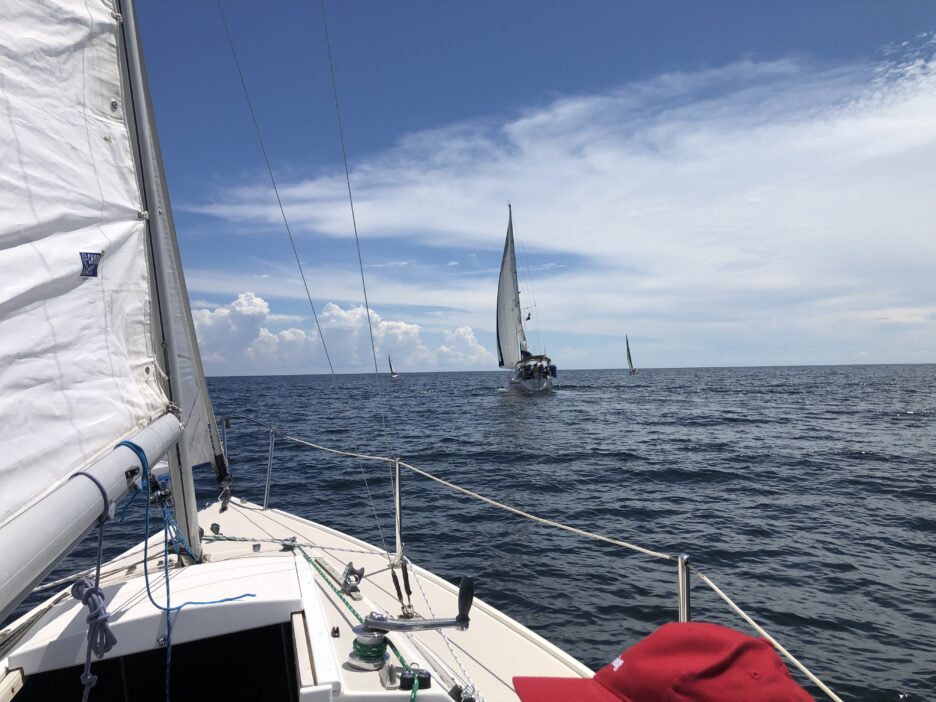We recently headed out to Apalachee Bay for an afternoon daysail and unexpectedly received another lesson in small sailboat handling!
The weather forecast the previous day was for partly sunny skies and light winds (1-2 mph). We ended up with a beautiful sunny afternoon with steady winds of 8-10 mph.
We sailed the Maxie, a 22-foot Catalina Capri daysailer available to members of the Apalachee Bay Yacht Club at Shell Point, Florida. This hardy boat is turning out to be a great teacher.
Steady winds test our sail-setting skills
We were pleased with change in weather. Instead of dawdling about in calm seas – which would have been fine and relaxing – we ended up experimenting with different ways to set the jib and mainsail. We struggled a bit in the beginning. But we eventually set the sails to efficiently manage the wind to improve the power and speed of our Maxie.
In the video below, you can hear the flap of the jib (luff) as we failed to fully fill the sail with wind. You can also see the ripples in the sail. The objective is to keep the sails tight with the wind. (Note, however, the 180 degree video which provides a great example of how nice the day ways for a day sail.)
After some experimentation, we adjusted the sails to fill the jib, flattening the sail. The telltales – strips of fabric fixed to the sail for determining wind direction – were son horizontal, indicating the sail was properly set for maximum efficiency. (Sorry, I do not have video of this.)
We settled into a series of long tacks on a beam reach with the winds coming across the boat at a 90 degree angle.
Afternoon swells test our sailboat handling skills
After a couple of hours, with high tide well past, we turned back to home. In order to get back to the slip at ABYC on time, we need to either run with the wind or sail on a broad reach (with winds coming from our backs). We ended up, as the video below shows, on close-hauled broad reach because we had to tack toward the channel.
With the sails trimmed tightly for maximum speed, we normally would have made good time.
However, the winds had picked up. Rather than a nice clip of 8 to 10 mph, the winds seemed to pick up to more than 10 miles per hour. These higher winds also increased the frequency and height of the waves. As a result, our boat was tossed around quite a bit.
Maxie was rocking quite a bit as the video above shows. At times, a large swell would pick us up enough and turn us so that we lost the power of the wind in our sails. We never lost all the wind power, so we could still maneuver to get on our preferred tack. The roughness of the water was likely made worse by the ebbing tide – the wind was working against the current of the receding waters, making the waves choppier.
If we wanted a smoother ride, we could have turned to take on a less severe reach. This would have allowed us to ride the waves more smoothly.
Getting back to the dock on time
But this navigational choice would have also added time to our journey. With the tides in full ebb, I felt it was safer to get back to the dock.
We ended up at the safely moored to the ABYC dock by 4:45 pm, just a bit later than I had hoped.
All-in-all, the Maxie and winds provided for another very satisfying day on the water.
Takeaways for the day
A couple of takeaways from the day’s sail:
- Sail within the parameters of your sailboat handling skills and your boat’s design. But be careful to stay within your parameters. (See here when you push the limits.)
- Experiment when steady winds give you an opportunity. We learned a lot simply trying different ways to set the sail and how to handle the boat on different tacks.
- Your boat’s handling can vary significantly based on your “point of sail.” Taking the time to appreciate the feel of your boat on different angles to the wind with different trims is well worth the time.
- Keep track of time and distance. If we had waited for the tides to ebb even further, returning to the dock would have been more of a challenge.
Don’t forget to check out The Pirate of Panther Bay, my series of historical fiction pirate novels. Isabella remains one of my favorite characters.

Ahoy Sailor!
Hope to see you at the Smith Regatta. If you have time, we could show you our boat. Our dock is on the main canal on the basin.
Happy Sails ’til we meet again.
Marvin and Lee
Great to see you at Word of South in Tallahassee and reconnect! I will be at the Smith Regatta. I would also love to see your boat. I hope to pick up registration materials on Friday night, but I’ll definitely be there most of Saturday.